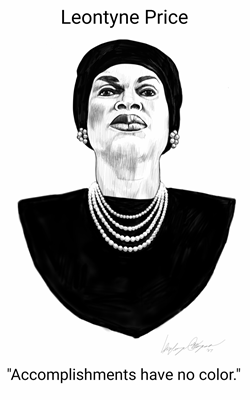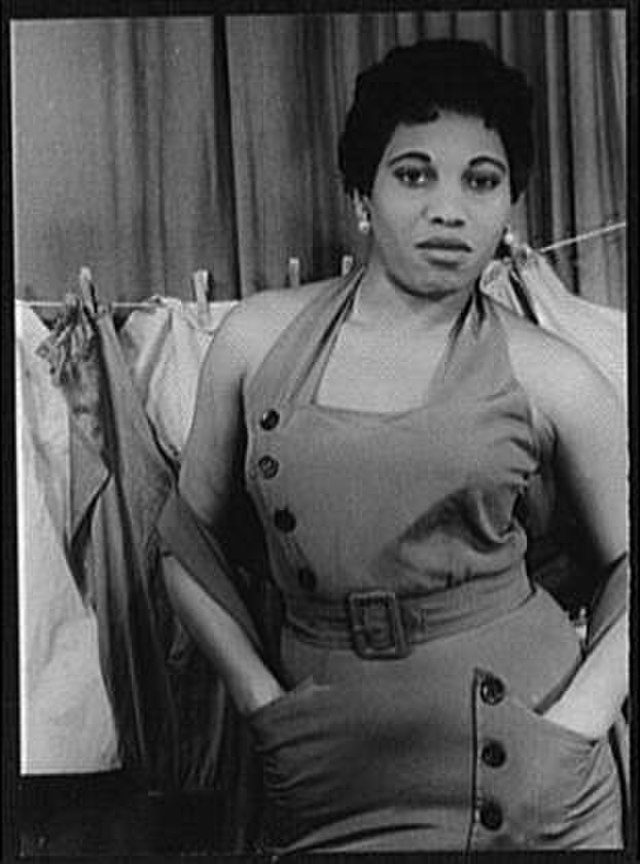 Saint George ThompsonLeontyne Price Portrait
Saint George ThompsonLeontyne Price Portrait
When operatic spinto soprano Leontyne Price could not afford the tuition fees needed to attend The Juilliard School, fellow singer Paul Robeson organized a benefit concert which enabled her to enroll.[1] When she sang her debut at the Metropolitan Opera House on January 27, 1961, the audience erupted into a standing ovation that would last for an astounding forty-two minutes.[2] Hearing her voice, it’s not difficult to understand why. Leontyne Price was not only one of the first African American sopranos to garner international recognition but is one of the greatest operatic sopranos of all time.[3]
Leontyne Price was born on February 10th, 1927, in Laurel, Mississippi, to James Anthony and Katherine Baker Price. Her father was a carpenter, her mother a midwife, and the family was devoutly Christian.[4] Leontyne loved listening to her mother sing in the church choir from an early age and began learning to play the piano herself at just five years old. When she was nine, Price went on a school trip to see Marian Anderson sing in Jackson, Mississippi; the experience was transformative and instilled in her a deep appreciation for classical music.[5] When she later joined Oak Park Vocational High School, she played piano at the school church services and concerts and performed at local functions to earn money.[6]
In 1944, Price left to study to become a music teacher at Central State University in Wilberforce, Ohio. During her first two years there, Price sang in the glee clubs and choirs, though she didn’t yet recognize her talent. It wasn’t until Dr. Charles H. Wesley – the university’s president – heard her perform and suggest she change her major to vocal studies that Price began to take singing more seriously.[7] It was once she changed her major that Price met and shared classes with Paul Robeson – an operatic bass who later became famous as a singer, actor, and activist. When Robeson learned that Price hoped to go to Juilliard but would struggle to come up with the tuition fees, moved by her talent, he organized a benefit concert through the college to raise funds.[8] In June 1948, she received her MBA and made her way to The Juilliard School in New York.
Whilst at Juilliard, Price took opera workshops and began singing in small roles in the class performances. In 1952 she took the role of Mistress Ford in Verdi’s comic opera Falstaff, a performance witnessed by renowned composer and critic Virgil Thompson. Thompson was so impressed with Price’s voice, that he asked her to perform in a revival of Four Saints in Three Acts, his all-black opera, which was to be performed on Broadway for two weeks before completing a run in Paris.[9] Upon her return from Paris, Price was cast as the leading role Bess in Gershwin’s Porgy and Bess directed by Robert Breen, which toured the US, London, Paris, Vienna, Berlin, and Russia. Price received glowing reviews around the world and quickly achieved international acclaim.
 Carl Van Vechten via Wikimedia CommonsPortrait of Leontyne Price, in "Porgy & Bess"
Carl Van Vechten via Wikimedia CommonsPortrait of Leontyne Price, in "Porgy & Bess"
From then, Price’s success continued to grow on both the stage and screen. In the late 1950s, she made numerous appearances in television productions of operas such as a production of Mozart’s Magic Flute by NBC. She continued to reach new heights, making her opera house debut at the San Francisco Opera House in 1957 as Lidoine in Poulenc's Dialogues of the Carmelites. The following year she made her European operatic debut in the titular role of Verdi’s tragic opera Aida at the Vienna State Opera, before performing in the same role at Covent Garden in London.[10] In 1960, she performed as Aida again at Teatro alla Scala (La Scala) in Milan, Italy, one of the most prestigious theaters for opera and ballet in the world. In doing so, she became the first black person to perform in a leading role at La Scala.
Following this string of performances, Price was invited to sing at the Metropolitan Opera. On January 27, 1961, she made her debut as Leonora in Verdi's Il Trovatore. As the performance ended, the audience erupted and applauded for forty-two minutes.[11] In an interview with Alan Blyth in 2017, Price explained
I suppose it was my success at La Scala that led to my engagement by the Met. When I finally sang there I went out of my head with joy because here I was really being accepted at home. Then there was another – and most important – point. I don't know how to put it without somehow sounding conceited but I was, of course, the first black diva in the history of the house. And I give the credit to Rudolf Bing [the Met's general manager]. Because of his foresight he opened the door for black singers. Mind you, once I'd put my foot in the door, I was determined to keep it there.[12]
When her first season at the Met came to an end in 1962, TIME Magazine wrote that Price had “a voice like a banner flying.”[13] Two years later, she was awarded the Presidential Medal of Freedom, just one award in an extensive list of honors that she has received throughout her career.
Over the course of her career, Leontyne Price has performed in prestigious venues across the globe and has accumulated an unfathomably long list of achievements which are made even more impressive by the fact she had to overcome several racial barriers in order to reach such levels of success. Since her retirement, Price has focused on encouraging young black artists to pursue their passions and follow in her footsteps. On this, Price said
I often give benefit concerts for colleges in Mississippi, and I would like to get myself more involved with youth groups. I know from my own experience the situation of poor students and anything I can do to help them I shall do. They must be given their first chance.[14]
[1] Story, Rosalyn M. (1990). And So I Sing: African American Divas of Opera and Concert. Amistad Pr; Reprint edition (1993).
[2] HipHopera Guy. Who is Leontyne Price? [Online] Available https://www.youtube.com/watch?v=QC4EcYzmYoc. 2024.
[3] Erickson, Shannon. Mary Violet Leontyne Price [Online] Available https://www.blackpast.org/african-american-history/price-mary-violet-leontyne-1927/. 2008.
[4] The Kennedy Center. Leontyne Price [Online] Available https://www.kennedy-center.org/artists/p/po-pz/leontyne-price/. 2025.
[5] Blyth, Alan. Leontyne Price interview: 'It's terrible but you know I just love the sound of my own voice' [Online] Available https://www.gramophone.co.uk/other/article/leontyne-price-interview-it-s-terrible-but-you-know-i-just-love-the-sound-of-my-own-voice. 2017.
[6] The Kennedy Center, 2025.
[7] Ibid.
[8] Rosalyn, 1990.
[9] The Kennedy Center, 2025.
[10] Ibid.
[11] HipHopera Guy, 2024.
[12] Blyth, 2017.
[13] Garland, Phyl "Leontyne Price: Getting Out At the Top. A prima donna assoluta says goodbye to the opera, will continue as concert singer" [Online] Available https://books.google.co.uk/books?id=CNkDAAAAMBAJ&pg=PA31. 1985.
[14] Blyth, 2017.
Page created on 1/31/2025 9:25:33 PM
Last edited 1/31/2025 9:35:31 PM
